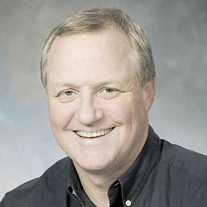Are We There Yet?
October 19-25, 2015
By Jay Edwards
Nothing ever becomes real till it is experienced. – John Keats
There are single words that create a bond between two people; words that have different meanings to only them because of associated memories. Like when I hear the name “Keats,” I’m taken back 40 years to Father Tribou’s English class. It was there we studied the odes of the famous poet who died at 25 from tuberculosis, that strangulating disease infamous enough to be known only by its initials, and which probably kept kids named Thomas Benjamin or Toby Bartholomew from getting the similar cool nicknames that DJ or RW enjoy.
Colford wasn’t in that class with me, but for months, every time I would see him, which was almost every day because we were pals, he would flash a sly grin and with a higher than normal pitch, and just say, “Keats.”
Perhaps I ran into him one day after the class.
“What’s going on, Stork?” he might have asked after slamming his metal locker shut. (I was tall and skinny back in those days.)
“What’s going on? I’ll tell you what’s going on Mr. Colford,” I might have responded in my best man of the black robe imitation. “Beauty is truth, truth beauty – that is all ye know on earth, and all ye need to know.”
And Colford might have stared at me “as if I had lobsters crawling out of my ears.”
“That’s Keats. Don’t you know anything?”
And from then on, whenever I’d see him, he would give me, “Keats.” And we would both laugh. So for that, I am forever grateful to the young poet who lived over 200 years ago.
It could have all gone differently. What if I had instead said to Colford, “You are always new, the last of your kisses was ever the sweetest.”
Yeah, my first choice was definitely the right one.
There is one other word I will always associate with Owen whenever I hear it. And like Keats, is also a proper noun but from the opposite end of the creative spectrum. It’s “Billy,” from the 1974 slasher horror film, “Black Christmas.” It is a Canadian film and the name was changed to “Silent Night, Deadly Night” for its American release.
It’s about a deranged killer in a sorority house during the most wonderful time of the year. He also made obscene phone calls to the girls, saying, among other things I won’t repeat here, “Billy.”
When Owen said it, it was in his same “Keats” voice, just with more syllables.
Spoiler alert!
We never learn the killer’s identity, thinking it was most likely Keir Dullea. His girlfriend, Jess, played by Olivia Hussey, thought so, too; hence, the reason she bludgeoned him to death in the basement. Then the cops burst in and take her to the hospital.
The officers leave Jess to sleep in her bed, stating that a man will be right outside the front door. Once the house is quiet, the camera pans from Jess’ room to the attic ladder and up, where we see Clare and Mrs. Mac’s bodies still unfound, untouched. Then we hear the killer say, “Agnes, it’s me, Billy.” The camera pulls back to show the outside of the house. The film ends as the telephone begins to ring as the credits roll.
“That’s Gold, Jerry, Gold!”
“Black Christmas” was very intense and scary, but didn’t do well at the box office. The main reason, I think, was most of us were still trying to recover from a head spinning, foul mouth little girl up in Georgetown who played with Ouija boards.
Jay Edwards is editor-in-chief of the Daily Record. Contact him at jedwards@dailydata.com.



